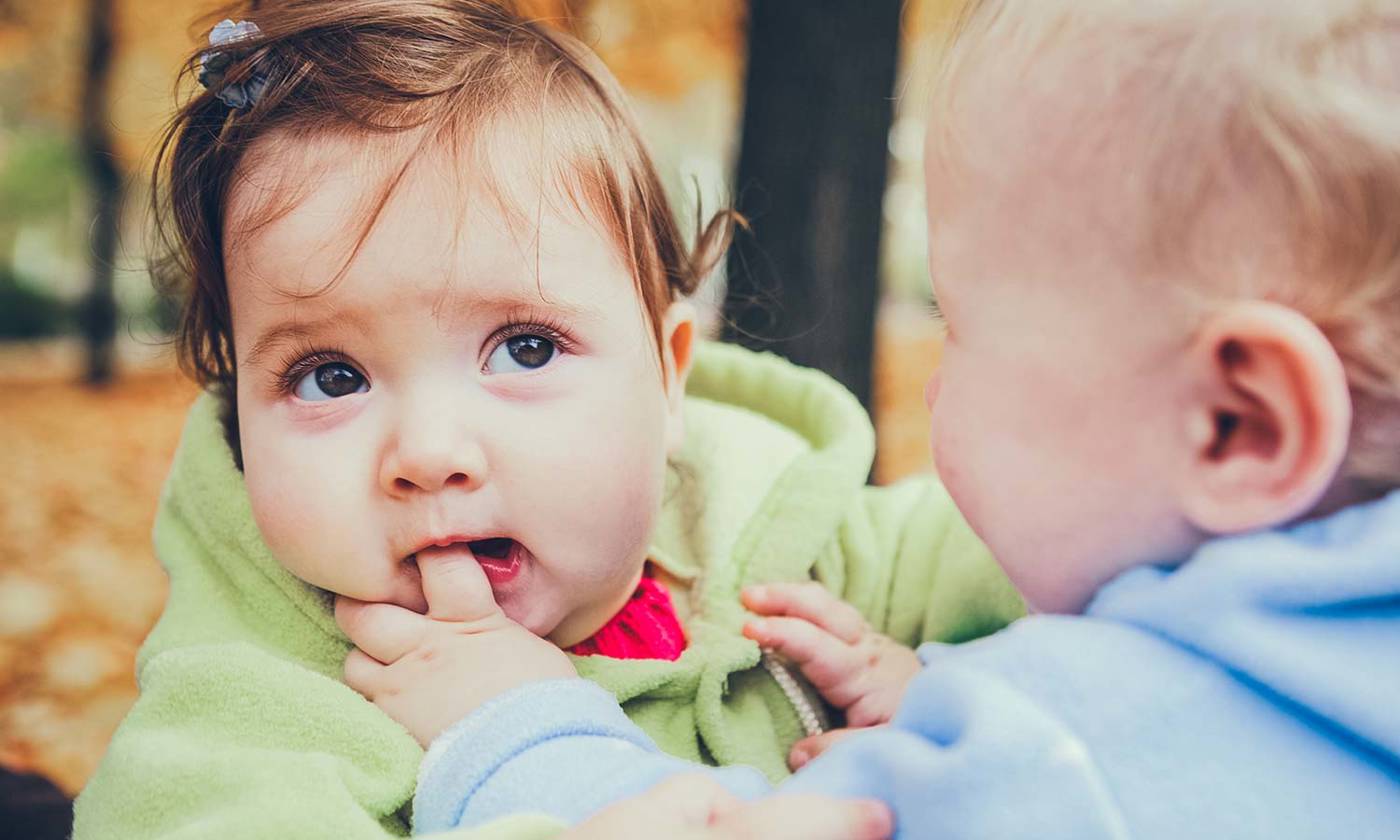Like what you see?
Sign up to receive more free parenting advice.
Thank you for subscribing to our newsletter!
Child Development

Credit: iStock.com/anatols
It’s one of those thoroughly embarrassing parenting moments when you discover your child is “the biter” – the one who bites at birthday parties, pinches at child care or pulls hair in the playground.
A future flashes before your eyes that involves your sweet toddler growing up and being marched to the primary school principal’s office, expelled from high school, facing juvenile detention for petty crimes and then a lifetime behind bars for a series of unthinkable offences.
While this is how parents can feel, it’s not necessary to see it as a parenting failure or to be embarrassed. Biting is, for some children, a normal part of exploring their environment and a response to under-developed toddler communication skills. This doesn’t make the behaviour okay, however understanding why children may bite or be aggressive along with some simple strategies can help parents navigate this phase of childhood with greater ease and confidence; and a lot less stress.
Dr Lesley Jones, has held a range of senior leadership positions in long day care organisations operating across Australia and her PhD thesis explored educator capacity to support the development of social competence in young children. Dr Jones says it’s important to remember toddlers are developmentally not as experienced as older children in dealing with social and emotional situations.
“They are inexperienced human beings. Toddlers are just really beginning to explore the bigger social world and, in many instances, mixing with children outside of their own family groups for the first time. Their ability to problem solve, communicate, negotiate and cope with social situations is still just beginning to developing,” Dr Jones says.
“If your child is the one who bites at birthday parties then it’s natural to feel anxious that your toddler may not cope (and perhaps attempt to bite) in such situations.
“We often see parents take on an enormous sense of guilt when children aren’t behaving as we think they should. But we need to remember that just because your toddler is struggling right at the moment, it doesn’t mean this will always be a problem.
“Being supportive, having clear expectations that the child understands really well, and helping your little one to learn the skills needed to be successful in sharing, using their words, and empathy are really important skills for parent to teach.
“Being deliberate about taking the time to physically teach your child the skills involved is time well spent.”
We often see parents take on an enormous sense of guilt when children aren’t behaving as we think they should. But we need to remember that just because your toddler is struggling right at the moment, it doesn’t mean this will always be a problem.Dr Lesley Jones
Dr Jones says this means working with your child to demonstrate and practise the skills (at times when they are calm and not under pressure) to:
- Learn what using words sounds like rather than venting frustrations physically. Use words or gestures so your toddler can see how we can use words rather than actions when we are emotional rather than biting for instance. Model the words and language for them in the beginning e.g. “I can see you are really angry; remember we use our words. Say; ‘NO, MINE’ or, ‘STOP, MINE’”. In the early days this approach is infinitely better than letting the child’s emotions escalate to biting and helps other children understand your child is becoming frustrated.
- Learn what ‘gentle hands’ feels like. Your idea of gentle and a toddler’s view of gentle can be very different. Demonstrate what gentle feels like, so they learn exactly what you mean.
- Learn what sharing actually looks like. Sharing and taking turn is a complex reciprocal behaviour between two or more children. It’s like learning a behavioural dance. There are lots of subtle aspects to share or take turns successfully. Inexperienced toddlers don’t know the steps; so as a parent break it down. For example, demonstrate giving and taking between yourself and the child so they can practise this part. Practise asking for something and waiting for consent from the other person.
Teaching skills to young children doesn’t have to be boring. Dr Jones also emphasises that teaching these skills can easily be made into an enjoyable game between parent and child.
Most importantly this teaching time should not be done when your child is in the middle of a 'behaviour'. This is the time when (if parents have laid the ground work of practice) the parent can be focused on reminding the toddler about what they have learned previously.
Why children bite
Having a good understanding of toddlers requires ‘tuning in’ to where your toddler is at on any given day. It helps to understand and respond to toddlers as they are, and to appropriately support them in their development and learning. What was not an issue last week, can definitely be a problem this week; and what was a huge issue last month is no longer even a speed bump.
In terms of general development Dr Jones says there are some important things to be mindful of with toddlers:
- They are just really learning that they are individuals. They are just learning about independence and autonomy. These two big concepts are critical to healthy development but some toddlers need to flex this new-found knowledge more than others. Finding appropriate outlets for children to be independent, and to do things for themselves, and make their own decisions in safe and appropriate ways is important. If little ones don’t get this opportunity provided they will often seek it in unsafe or inappropriate settings that parent cannot accept.
- They get frustrated at times because they are unable to regulate their emotions. Toddlers have not yet fully learned how to moderate their emotions by themselves as adults do. Situations become overwhelming for toddlers and they can lose control which may result in tantrums—expressions of overwhelming feelings which they cannot manage in any other way.
- They want to touch and explore everything and do it now, with lots of repetition, experimentation, mastery and little focus on the end result—this can be frustrating for adults but for toddlers it is important in helping them gradually learn about the physical world, acquiring skills and developing concepts such as number, time, space and similarities and differences.
- They can be anxious and distressed about separating from parents or a trusted carer, or even not being able to find a special comforter.
- They may begin to share or take turns with help, but at times may strongly resist this.
Dr Jones says it is important to avoid pressuring toddlers to take turns and accept that being unable to share is part of being a toddler. If necessary take an active role in helping find alternatives — always explaining in simple words what is happening.
Small children generally bite from about 12 months of age when they are growing teeth and begin exploring the world through their senses (taste, smell, sight and touch).
Biting is most commonly seen in groups of children aged between one and three years old. These are the children who are exploring the world but don’t always have the benefit of speech to communicate what they want.
By the age of three, biting becomes much less prevalent because by then children start to discover other ways of communicating.
In the past there were many ways of ‘dealing’ with a child who bites – exclusion, biting the child back as punishment. But we know that these methods are not effective.
Dealing with biting all comes down to having an understanding of the behaviour.
What to do about toddler biting
Goodstart Early Learning National Inclusive Practices Consultant Troy Dunn says while many people think children bite to hurt other children, this is not usually the case.
“Young children, because of their age and development, can be very egocentric and may often find it difficult to think about and understand how their actions impact on others,” Mr Dunn says.
“It is unrealistic to think that all young children in early learning and care settings will have the developmental skills to share and show care to others.”
Biting can be a way of trying to get attention from parents and other children, and also a way to get the toys they want to play with quickly, especially if that behaviour has worked in the past.
“Until they develop appropriate social and emotional skills such as turn taking and empathy, they may not understand how their actions affect other people. However, as they get older, children’s social development starts making them feel and show empathy.”
“It’s very important to understand the reason for the biting. In some cases, it could be teething and the child may just need to be encouraged chew on something more appropriate,” Mr Dunn says.
He says if a child is biting to access resources, we should consider if the number of resources available is sufficient. This is particularly relevant in an early learning setting.
“If it’s out of self-defence, you should look at the situation and ensure it is being monitored.”
Developmental factors which may cause biting include:
- Frustration that they can’t talk or communicate in any other way is one factor that can lead to biting. Encouraging language and non-verbal communication can help.
- Teething. Providing something for the child to chew on can help.
- Limited self-control. Children in this age group can be impulsive and often can’t stop themselves from doing something.
- Competition for adult attention. Ensure the child has some one-on-one time on a regular basis.
Get Advice
Real parents. Real problems. We’re here with a group of leading early learning and parenting professionals to answer your questions.







